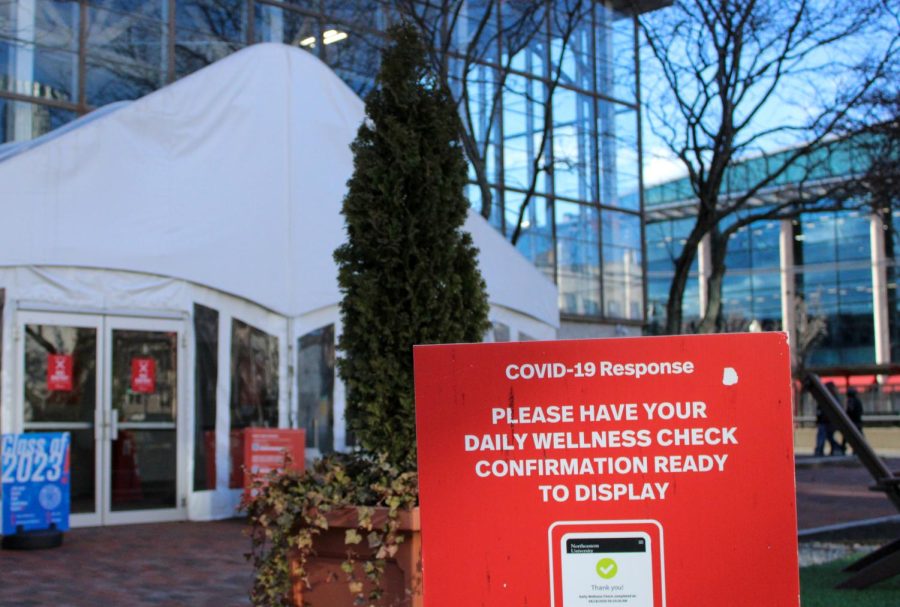Students react to end of mandatory weekly COVID-19 testing
Northeastern announced Feb. 18 that effective Feb. 28 community members will not be required to test weekly if they are asymptomatic. The COVID-19 data dashboard will also be retired at the end of the month.
February 19, 2022
The latest step in Northeastern’s plan to treat COVID-19 as an endemic came Friday morning. In an email to students, Provost and Senior Vice President for Academic Affairs David Madigan and Chancellor and Senior Vice President for Learning Ken Henderson announced that mandatory weekly testing and the COVID-19 data dashboard will soon be things of the past.
“We will continue to monitor developments and adapt our approach as needed,” read the email. “We want to thank each and every one of you for your hard work and agility that has helped us collectively maintain a successful and thriving teaching and research enterprise.”
Effective Feb. 28, weekly testing will be optional for asymptomatic students. Those experiencing symptoms will still be required to test.
The email also announced that the university is “evaluating” their mask mandate — at some campuses, including Nahant, Burlington, London, Portland and the San Francisco Bay Area, mandates have already been lifted, but the City of Boston and NU’s Boston campus, have maintained their mandates.
Once the email landed in student’s inboxes, many students took to social media to express their thoughts — some positive and some negative.
Some students support the easing of testing requirements and say that as a fully vaccinated community, the risk to most people is low. For Dillon Lewis, a fifth-year computer science and physics combined major, requiring testing weekly, on top of other precautions feels like overkill.
“I feel fine about [no longer having required weekly testing]. It’s still optional. People need to get tested if people are feeling sick or if people know others who have COVID and think they were exposed,” Lewis said. “We’re all vaccinated. So what are the vaccines for if we still have to test weekly?”
He said the vaccination and booster requirement feels like the most effective way Northeastern has adapted to control the effects of COVID-19.
For other students who don’t support Northeastern’s most recent rollback of restrictions, it’s more a matter of “better safe than sorry.”
“I would like to see Northeastern prioritize the health of the community over the PR of a success story,” said Jacob Kemp, a third year political science major currently on co-op in Greece. “I think there’s absolutely nothing wrong with being safer than sorry because that’s what allowed us to have such a good campus experience over the last year and a half. And I really don’t think that taking 20 minutes to get tested once a week is that heavy of a lift for anybody.”
Students who spoke with The News who think the testing mandate should stay in place pointed out that testing is an efficient process that can help put a lot of people’s minds at ease and urged Northeastern to keep the most vulnerable and marginalized community members in mind.
Though Emerson Toomey, a fourth-year philosophy major, has not felt comfortable with in-person classes during COVID-19 at all due to other medical problems, she said she will feel less comfortable once testing is no longer required.
“I’m somebody who has two comorbidities and I’m expected to still show up to classes and behave as if nothing has changed,” Toomey said. “When in reality, things have changed and now I’m at a much higher rate for contracting COVID and getting really sick.”
Rosie Delgado, a fourth-year civil engineering major, agreed and said the lifting of these restrictions is making her feel unsafe on campus.
“I previously felt safe on campus when the measures to protect us were there, things like wearing masks, things like regular testing. But with the loosening of these kinds of restrictions and guidelines, I definitely feel less safe,” Delgado said. “As a resident assistant, someone who’s supposed to be a community leader and help enforce these guidelines, I feel like we’re bearing the brunt of these decisions.”
The students who spoke with The News were eager to move beyond COVID-19, but did not all agree that now was the right time.
“Listen to the most marginalized students here on campus and let them kind of give their point of view and what they think should happen,” Delgado said. “We want to feel safe on campus. We also want to see the end of COVID, but we don’t think that we’re there yet.”
Delgado pointed to the economic differences present within the NU community and said it is important to keep in mind that these rules do not only affect students who have the luxury of isolating themselves easily and have access to good health care.
“Looking at who will be most impacted by these rollbacks, it’s going to be resident assistants … It’s going to be dining hall workers. It’s going to be people who work on campus,” Delgado said. “It’s going to be basically the working class at Northeastern who will be most impacted by this and of course, all the rich students basically can almost afford to ignore this. It’s not the time to ignore, it’s time to bring back the measures.”
Delgado said they independently support organizations like Huskies Organizing With Labor, NU Mutual Aid and the NEU RA co-op, that work to help people on campus.
The lifting of testing requirements has the potential to ripple outside the Northeastern community. The Boston campus is situated on the borders of neighborhoods like Roxbury that often do not have the same access to testing and other COVID-19 precautionary measures.
“As students who are on campus, we’re in the middle of four different communities of Boston. Most of us are basically like guests in the city,” Toomey said. “Allowing us to stop mandate testing and to get rid of our mask requirement and to do all these things means putting all these people at risk.”
Though the mask mandate is still in place, as mandates fall across the country it seems inevitable they will eventually fall in Boston too. Some students are concerned that the elimination of mask mandates would cause a spike, while others don’t always see the benefit of masks on campus.
Lewis said he often sees people not wearing masks correctly, despite NU’s mandate.
“I don’t feel like that’s doing so much because everyone in Curry is eating and drinking, nobody wears a mask. You go into the tents, nobody’s wearing the mask,” Lewis said.
The Northeastern COVID-19 data dashboard that has been in operation since Sept. 6, 2021, will no longer be updated at the end of this month. Toomey said she thinks the data dashboard is an important part of keeping the community in the loop.
“I know that COVID has has sort of become normalized in the last two years, but that doesn’t mean that our right to know how our campus is doing and how the people around us are faring should be taken away,” Toomey said.
In an interview with The News last month, Henderson said the dashboard was an important resource to understand community spread.
“We think that it’s actually a useful tool to tell the campus community about the prevalence,” Henderson said. “While it’s not the driving force for decision-making it is still one data point which is useful for us.”
At the time, he said the university did not plan to remove the dashboard “for the foreseeable future.”
While displaying data of optional tests would not be representative of the entire campus community, students expressed that having a glimpse into the state of COVID-19 on campus is beneficial. In the last seven days of published data, Northeastern has recorded 548 positive tests. The News calculated the seven-day positivity rate at 2.3%.
“I try to understand why, because they won’t have fully representational data for the university,” Lewis said. “But I’m still kind of mixed on that because, do they still have the archive data somewhere? Or is there any kind of statistic that we can ask about? Because it’s good to know every once in a while.”
Students seem to be divided on Northeastern’s newest policies. Some students have expressed online that they are excited to return to a more normal life, while others — some of whom have first hand experience with COVID-19 infections — caution that the virus can still have impactful negative effects.
Several of the students who talked with The News expressed that weekly testing, as has been the norm on the Boston campus this year, is not too much to ask of students to help keep people safe.
“I really feel like it doesn’t hurt anyone,” Toomey said. “At this point it’s become such a streamlined process that it takes maybe five minutes total. A little bit more if there’s a line, but still, it doesn’t take that much out of your day. And if it puts everyone else’s minds at ease, and it’s free, there’s no reason not to do it.”
Though Kemp is not on campus right now, he has been on campus throughout the rest of the pandemic and he pointed to Northeastern’s well-recognized successes in controlling COVID-19 up until now, calling the recent rollbacks a “sudden reversal.”
“The only way that COVID at Northeastern got to really low levels was because of really stringent access from university. So the only way it’s going to stay at low levels is from continued stringent action from the university,” Kemp said.
Many people calling for an end to restrictions point to the significant mental health toll the pandemic has had on everyone, including college students. Kemp said he has felt these effects too, but said testing doesn’t contribute to those issues in the same way as past measures like capacity limits.
“We’re still going to have clubs, we’re still going to have classes, students are still going to be able to be socialize with each other,” Kemp said. “All we’re asking for is to continue testing students, to continue asking students to wear masks inside. So that’s all possible. These are not heavy lifts.”
Northeastern is not the only university who recently announced changes to COVID-19 protocols — Emerson College, the University of Massachusetts Lowell and Lasell University all announced mask-related changes this week.
Despite the change on the air, some students remain unconvinced.
“We are lucky to get in and we are lucky to attend but at the end of the day, Northeastern as a university is providing us with the service,” Toomey said. “We’re here to get an education and we should be able to get an education without putting our health at risk.”







